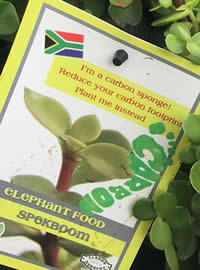 The #waterwise indigenous Spekboom is one of the best environmental warrior plants that one can grow. This has made them the certre of attention and the star for the #spekboonchallenge. They are the ultimate carbon busting plant in a world where CO2 emissions are part of the problem for global warming. By having one or more in your garden you will reduce your carbon foot print and if you have space for a hedge you could almost neutralise it almost completely.
The #waterwise indigenous Spekboom is one of the best environmental warrior plants that one can grow. This has made them the certre of attention and the star for the #spekboonchallenge. They are the ultimate carbon busting plant in a world where CO2 emissions are part of the problem for global warming. By having one or more in your garden you will reduce your carbon foot print and if you have space for a hedge you could almost neutralise it almost completely.
Their name is Portulacaria, better known as Spekboom in South Africa because they have fat (as in “Spek Vet”) little leaves and are sometimes refered to as the "Pork Bush" as a direct translation. Also known as the Elephant Bush from their natural habitat in the Eastern Cape where they are a staple food source for the Elephants of the Addo Park.
Their leaves are small, rounded, green to yellowish and succulent, held on red stems perfect to grow as a water wise shrub or even as a bonsai subject.
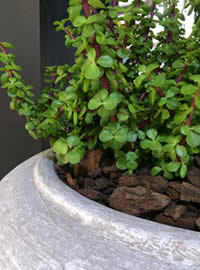 |
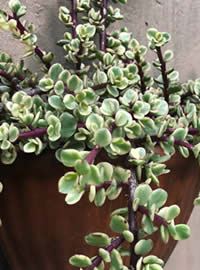 |
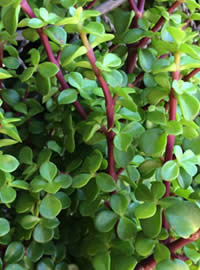 If left they will become a small tree of around 2 meters which is more a shrub size than a tree but it will take many years to do that. We recomend planting your spekboom as a medium size shrub where they get sun to half day sun and clip them to shape to keep them compact. They will make a great small hedge along a border or along a boundry wall.
If left they will become a small tree of around 2 meters which is more a shrub size than a tree but it will take many years to do that. We recomend planting your spekboom as a medium size shrub where they get sun to half day sun and clip them to shape to keep them compact. They will make a great small hedge along a border or along a boundry wall.
They are so versatile in the garden. If you need something to fill a dry arid spot they will work, if you have a wild indigenous garden they look awesome and if your garden is tailored and clipped with hedges and formal lines they look more at home than some of the other plant choices you could make.
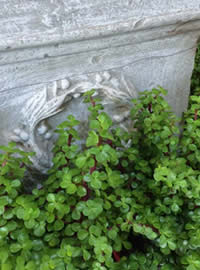 Towards the end of spring they get small pink flowers which cover the tips. The flowers attract a host of beneficial insects which add to their warrior status. The leaves are actually and packed with vitamin C. The acidy taste is makes them a fun addition to a summer salad or in a winter stew. They are also used in traditional medicine to treat dehydration and heat stroke.
Towards the end of spring they get small pink flowers which cover the tips. The flowers attract a host of beneficial insects which add to their warrior status. The leaves are actually and packed with vitamin C. The acidy taste is makes them a fun addition to a summer salad or in a winter stew. They are also used in traditional medicine to treat dehydration and heat stroke.
The sap from the leaves can also be used to treat skin ailments and provide relief for blisters and sunburn. Findings suggest that up to four tons of carbon a year would be captured by each hectare of these plants. Every garden should have one somewhere. We love this little environmental warrior and there is no reason not to grow one.






